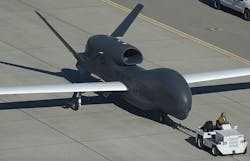Northrop Grumman gets $3.2 billion contract to handle Global Hawk upgrades over next decade
ROBINS AIR FORCE BASE, Ga., 1 Oct. 2015. Unmanned aircraft experts at Northrop Grumman Corp. will handle upgrades, technology insertion, and maintenance of the U.S. Air Force RQ-4 Global Hawk unmanned surveillance aircraft over the next decade under terms of a $3.2 billion contract announced Wednesday.
Officials of the Air Force Life Cycle Management Center at Robins Air Force Base, Ga., are asking the Northrop Grumman Aerospace Systems segment in San Diego to handle configuration management, data management, technical refresh, and component-obsolescence issues for all Air Force variants of the Global Hawk.
Northrop Grumman is the original equipment manufacturer of the Global Hawk unmanned aerial vehicle (UAV), which the Air Force uses for long-endurance and high-altitude surveillance missions throughout the world.
Global Hawk was designed by Ryan Aeronautical, which Northrop Grumman acquired in 1999. The UAV has a role similar to the U-2 high-altitude surveillance aircraft.
Related: Air Force asks Northrop Grumman to stiffen Global Hawk UAV defenses against cyber attacks
The Air Force awarded the contract on 30 Sept. 2015, the last day of federal fiscal year 2015 -- a time when many large contracts are let to clear up financial details at the end of the fiscal year.
The RQ-4 UAV provides broad-area surveillance using high-resolution synthetic aperture radar (SAR) and long-range infrared sensors. The aircraft can remain aloft for days and can survey as much as 40,000 square miles a day.
A Navy version of the Global Hawk called the MQ-4C Triton Broad Area Maritime Surveillance (BAMS) UAV assists the Navy's Boeing P-8 surveillance jet with anti-submarine warfare (ASW) and maritime patrol duties.
Contractor logistics support, although an expensive line item in the Pentagon budget, often makes sense in the modern era of complex military technology-especially as military personnel are taking a hit from U.S. Department of Defense budget cuts.
Related: Curtiss-Wright to upgrade flight-control computer for variations of Global Hawk UAV
Maintaining large and complex weapon systems such as the Global Hawk is a massive undertaking. The Air Force increasingly has chosen contractor logistics support as an alternative to in-house support of weapon systems since the last decade, particularly for depot maintenance for airframes and engines, as well as for parts repair and replacement.
Contractor logistics support normally involves several sustainment tasks, usually for the life of the weapon system. Examples of common contractor logistics support tasks are aircraft and engine overhaul, repair and replenishment of parts, sustaining engineering, and supply chain management.
Northrop Grumman will do the work involved in this contract in San Diego, and should be finished by September 2025. For more information contact Northrop Grumman Aerospace Systems online at www.northropgrumman.com, or the Air Force Life Cycle Management Center-Robins at www.robins.af.mil/units/aflcmc.

John Keller | Editor
John Keller is editor-in-chief of Military & Aerospace Electronics magazine, which provides extensive coverage and analysis of enabling electronic and optoelectronic technologies in military, space, and commercial aviation applications. A member of the Military & Aerospace Electronics staff since the magazine's founding in 1989, Mr. Keller took over as chief editor in 1995.



